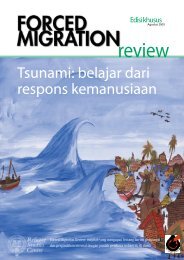FMR 42 full issue pdf - Forced Migration Review
FMR 42 full issue pdf - Forced Migration Review
FMR 42 full issue pdf - Forced Migration Review
Create successful ePaper yourself
Turn your PDF publications into a flip-book with our unique Google optimized e-Paper software.
<strong>FMR</strong> <strong>42</strong><br />
Sexual orientation and gender identity and the protection of forced migrants 37<br />
no visible signs of them and certainly no gay<br />
bars or clubs. Social conventions dictate that<br />
most young people in Kosovo live with their<br />
families until they marry; those who ‘come<br />
out’ as LGBT risk being kicked out of the<br />
family home, ostracised by their families and<br />
marginalised by their community. Some are<br />
married off as their family attempts to control<br />
their sexuality or ‘cure’ them. Indeed, many<br />
in Kosovo believe that LGBT individuals<br />
are deviant or suffer from a mental illness.<br />
Despite this, the LGBT community in<br />
Kosovo is very much alive and recently a<br />
small number of LGBT individuals have<br />
dared to break the silence and speak out.<br />
In Kosovo, discrimination against LGBT<br />
people is social rather than official –<br />
perpetrated by non-state actors such as the<br />
asylum seeker’s family or close community.<br />
As in theory there are legal guarantees in<br />
place in Kosovo to prevent discrimination,<br />
officials considering asylum claims by<br />
people from Kosovo on the basis of sexual<br />
orientation or gender identity expect them<br />
to have access to legal remedies to enforce<br />
their rights; Kosovo is therefore usually<br />
classified as a country where LGBT people<br />
are not in danger of persecution. 2 In reality,<br />
says a source, there is a significant gap<br />
between legal protection on paper and<br />
implementation on the ground. Reports<br />
of discrimination against LGBT people<br />
are apparently seldom taken seriously by<br />
the police and to date no discrimination<br />
case on the ground of sexual orientation<br />
has been brought before the courts.<br />
information is of course informal, and should<br />
certainly be considered with care, but it has<br />
the advantage of being first-hand and relying<br />
on the statements of people in direct and<br />
extensive contacts with the LGBT community<br />
on the ground. “Kosovo is a small place<br />
and LGBT people are a tight community”,<br />
an activist says. These groups provide<br />
an appraisal of the situation of a specific<br />
LGBT individual, who is in all likelihood<br />
known within the local LGBT community.<br />
Grounds for asylum<br />
It is increasingly common for asylum seekers<br />
from Kosovo to claim sexual orientation<br />
as a ground of persecution; indeed, this<br />
is not unique to Kosovo but rather part of<br />
a regional trend. 3 Helped by the internet,<br />
which serves an as important platform for<br />
Kosovo’s repressed and underground LGBT<br />
community, LGBT people are becoming<br />
increasingly aware of their human rights.<br />
They no longer feel the need to conceal<br />
the real reasons – their sexual orientation<br />
and gender identity – when seeking refuge<br />
from violence in countries of asylum.<br />
However, an LGBT rights activist based in<br />
Kosovo estimates that less than a third of<br />
asylum seekers invoking sexual orientation<br />
or gender identity in their claims are<br />
genuine. According to this activist, many<br />
are desperate to leave to find a better life<br />
in richer countries and not necessarily<br />
because they have a well-founded fear<br />
of persecution owing to their sexual<br />
orientation or gender identity in Kosovo.<br />
Added to this is the fact that the risk faced<br />
by an asylum seeker has to be assessed on<br />
the basis of so-called ‘secure information’.<br />
However, in Kosovo this kind of information<br />
is not readily available, as there is a lack<br />
of up-to-date, detailed, published data<br />
pertaining to the vulnerability of the LGBT<br />
community. Interestingly, when the lack of<br />
‘secure information’ is problematic, states<br />
handling asylum claims originating from<br />
Kosovo have relied on information provided<br />
by local interest groups and NGOs with<br />
specific insights into LGBT rights. This<br />
Kosovo is reported to have the lowest<br />
employment rate in the Western Balkans<br />
and many young people – LGBT and non-<br />
LGBT alike – struggle to see any viable<br />
future for themselves and their families<br />
there. While people from Kosovo claimed<br />
asylum during and in the aftermath of the<br />
1990s’ conflict on the basis of ethnic and<br />
political persecution, sources indicate that<br />
these grounds are no longer accepted by<br />
many states as the political and security<br />
situation between the ethnic communities<br />
in Kosovo has now mostly stabilised.




